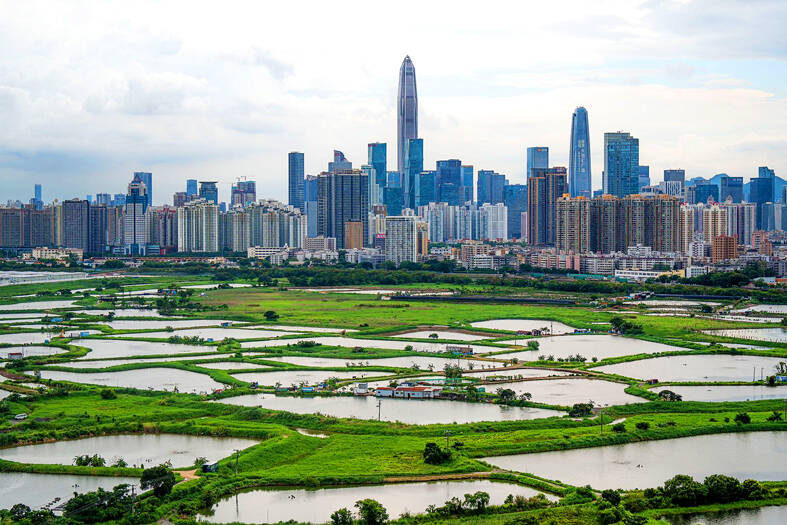Hong Kong intends to start reopening its borders with mainland China before mid-January, aiming to return to pre-2020 cross-border travel arrangements, Hong Kong Chief Executive John Lee (李家超) said.
The borders are to “open fully in a gradual, orderly way,” Lee said during news conference at the city’s airport on Saturday on returning from a trip to Beijing, where he met Chinese President Xi Jinping (習近平).
Lee’s team plans to hold talks with the governments of Shenzhen and Guangdong Province to formulate a plan to reopen the borders, and form a task force to focus on the issue. The group would report back to the central government, Lee said.

Photo: Bloomberg
Matters under consideration in the first stage of the plan include deciding the daily quota of travelers, and which border control points should be opened, he said.
The border between Hong Kong and mainland China has been effectively shut for nearly three years. Visitors from Hong Kong are limited by a daily quota, while they also must undergo five days of hotel quarantine. Mainland visitors also must quarantine on their return.
Lee did not share details about the quarantine policy after borders open, only saying he hopes to return to the arrangements before the pandemic.
Most of Hong Kong’s border checkpoints have been closed since early 2020.
Lee’s trip to Beijing was his official visit since taking office in July. Chinese Premier Li Keqiang (李克強) told Lee that Hong Kong needs to further integrate with the mainland’s development plans and consolidate its role as an international hub.
Meanwhile, Hong Kong could see an estimated 7.6 percent boost to its gross domestic product from China’s reopening, according to Goldman Sachs Group Inc economists.
The local economy is projected to have contracted this year for the third time in four years. The city hosted almost 44 million arrivals from mainland China in 2019.
Hong Kong scrapped most of its remaining COVID-19 restrictions in recent weeks, including a ban on new arrivals entering bars or restaurants, and ending a policy requiring people to scan a QR code when entering venues. People must still wear masks in public.
China is rapidly moving to resume normal economic activity as it dismantles its pandemic restrictions. Beijing plans to cut quarantine requirements for overseas travelers in January, Bloomberg News reported on Thursday.

MONEY GRAB: People were rushing to collect bills scattered on the ground after the plane transporting money crashed, which an official said hindered rescue efforts A cargo plane carrying money on Friday crashed near Bolivia’s capital, damaging about a dozen vehicles on highway, scattering bills on the ground and leaving at least 15 people dead and others injured, an official said. Bolivian Minister of Defense Marcelo Salinas said the Hercules C-130 plane was transporting newly printed Bolivian currency when it “landed and veered off the runway” at an airport in El Alto, a city adjacent to La Paz, before ending up in a nearby field. Firefighters managed to put out the flames that engulfed the aircraft. Fire chief Pavel Tovar said at least 15 people died, but

LIKE FATHER, LIKE DAUGHTER: By showing Ju-ae’s ability to handle a weapon, the photos ‘suggest she is indeed receiving training as a successor,’ an academic said North Korea on Saturday released a rare image of leader Kim Jong-un’s teenage daughter firing a rifle at a shooting range, adding to speculation that she is being groomed as his successor. Kim’s daughter, Ju-ae, has long been seen as the next in line to rule the secretive, nuclear-armed state, and took part in a string of recent high-profile outings, including last week’s military parade marking the closing stages of North Korea’s key party congress. Pyongyang’s official Korean Central News Agency (KCNA) released a photo of Ju-ae shooting a rifle at an outdoor shooting range, peering through a rifle scope

South Korea would soon no longer be one of the few countries where Google Maps does not work properly, after its security-conscious government reversed a two-decade stance to approve the export of high-precision map data to overseas servers. The approval was made “on the condition that strict security requirements are met,” the South Korean Ministry of Land, Infrastructure and Transport said. Those conditions include blurring military and other sensitive security-related facilities, as well as restricting longitude and latitude coordinates for South Korean territory on products such as Google Maps and Google Earth, it said. The decision is expected to hurt Naver and Kakao

Gaza is rapidly running out of its limited fuel supply and stocks of food staples might become tight, officials said, after Israel blocked the entry of fuel and goods into the war-shattered territory, citing fighting with Iran. The Israeli military closed all Gaza border crossings on Saturday after announcing airstrikes on Iran carried out jointly with the US. Israeli authorities late on Monday night said that they would reopen the Kerem Shalom crossing from Israel to Gaza yesterday, for “gradual entry of humanitarian aid” into the strip, without saying how much. Israeli authorities previously said the crossings could not be operated safely during